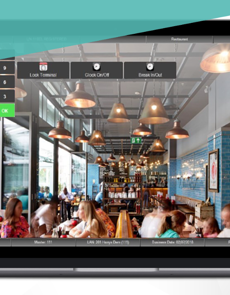How to choose the best mPOS (Mobile Point Of Sale) system
In the fast-moving world of hospitality, staying up-to-date with technology is essential for delivering excellent service and maintaining smooth operations. One game-changing tool that has become increasingly popular is the mobile point of sale (mPOS) system. But what exactly is an mPOS, and why is it becoming a vital tool for modern hospitality businesses?
A mobile POS is a portable device that acts like a cash register, allowing staff to process transactions anywhere across a venue. That means faster service and happier customers, which contributes to a healthier bottom line.
At Access Hospitality, we’re dedicated to helping hospitality businesses succeed with our range of software solutions. With over 20,000 sites across the UK and Ireland using our technology, we’ve had plenty of conversations with venues looking for ways to further improve the customer experience and streamline operations.
In this article, we’ll explain how mPOS systems work, from the hardware and software required, to the transaction process. We’ll also look at the benefits and drawbacks and review some top mPOS options on the market to help you make the best choice for your business.
Ready to find out what makes mPOS systems so special and why it might be just what your business needs? Let’s get started.
What is mPOS (Mobile Point of Sale)?
An mPOS transforms smartphones and tablets into portable point-of-sale terminals, allowing businesses to process transactions anywhere with internet connectivity. This setup offers significant advantages over traditional POS systems and can revolutionise the way hospitality businesses manage transactions.
The key benefits of mPOS for hospitality operators include:
- Convenience: With mPOS systems, transactions can be processed anywhere in the venue. This flexibility means staff can take orders and payments tableside, reducing wait times and enhancing customer service. Imagine the difference it makes during peak hours when guests don’t have to queue up to pay their bills; instead, their transactions are completed swiftly at their table, leaving them with a positive impression of your service efficiency.
- Flexibility: mPOS systems are incredibly adaptable to the changing needs of a business. Whether you’re running a small café or a large chain of restaurants, mPOS can easily scale up or down. During busy periods, you can add more devices to speed up service, and during slower times, you can reduce the number of active devices. This scalability makes mPOS a versatile solution for any hospitality business, from pop-up events to permanent locations.
- Cost-effectiveness: Traditional POS systems often require significant upfront investments in hardware and installation. In contrast, mPOS solutions generally utilise existing smartphones or tablets, reducing initial setup costs. Moreover, maintenance and updates are usually simpler and cheaper. This affordability makes mPOS systems an attractive option for many hospitality businesses, allowing them to allocate resources to other critical areas like staff training and customer experience enhancements.
By integrating mPOS systems, hospitality operators can streamline their operations, improve the customer experience, and adapt more swiftly to changing business demands.
How does a mobile POS work?
Mobile POS systems use a combination of hardware and software to turn smartphones or tablets into fully functional point-of-sale terminals. The hardware typically includes a card reader that can process various types of cards, from swiping magnetic stripes to chip and pin, and facilitating contactless payments. These card readers connect to mobile devices via Bluetooth or directly through mobile networks, ensuring seamless transactions regardless of the location within your venue.
The software component of an mPOS system involves dedicated applications that handle the transaction process. When a card is read, the application encrypts the card data to maintain security and sends the transaction details to a payment processor for authorisation. Once the payment is authorised, the system generates a receipt, which can be either printed or sent digitally to the customer. This streamlined process not only enhances operational efficiency but also improves the customer experience by reducing wait times and providing a more flexible service.
Connectivity is a vital aspect of mPOS systems, as they rely on stable internet access to process transactions. Whether through Wi-Fi or mobile networks, consistent connectivity ensures that payments are handled quickly and securely, making mPOS systems a versatile and reliable choice for hospitality operators. By integrating these components, mPOS systems offer a seamless, flexible, and secure way to handle transactions, enhancing overall efficiency and customer satisfaction.
How to choose a mobile POS
Maximising the potential benefits offered by an mPOS system means choosing the one that best meets your needs. But with so many solutions on the market, it can be challenging to make the right choice. To help you out, we’ve made a list of some key considerations to keep in mind when you’re weighing up your options:
Compatibility and ease of use
Ensure the mPOS system is compatible with your existing devices, such as smartphones and tablets. A user-friendly interface is vital for quick staff training and smooth daily operations.
Security features
Prioritise systems that offer robust security measures, including data encryption and compliance with industry standards This helps protect sensitive customer information during transactions.
Transaction fees
Evaluate the cost structure, including transaction fees, to ensure it fits your budget. Some providers may offer lower upfront costs but higher transaction fees, so balance these aspects according to your business volume.
Integration capabilities
The mPOS system should seamlessly integrate with other business tools, such as inventory management and purchase to pay software. This integration can streamline operations and provide valuable insights into your business performance.
Customer support and reliability
Research the reputation of the mPOS provider. Reliable customer support is essential for resolving any issues quickly and ensuring your system remains operational. Look for providers with positive reviews and robust support structures.
Best mobile POS and their features
With all of these considerations in mind, we’ve gathered up some of the most popular mPOS solutions for hospitality and listed the main features, and pros and cons of each.
1. Access Hospitality
Overview: Access Hospitality offers a comprehensive and scalable EPoS system designed to meet the needs of various hospitality sectors. Known for its ease of use and robust feature set, it is trusted by major brands like Killarney, Mount Charles and Left Bank Kilkenny.
Key Features:
- Real-time reporting: Provides detailed insights into sales, stock, and overall business performance
- Scalable technology: Easily adapts to the size of your business
- Integration: Over 80 integrations with popular apps for inventory, CRM, and more
- Menu management: Flexible and intuitive menu management system
Pricing: Custom pricing based on business needs.
Unique Selling Points:
- Trusted by well-known hospitality brands
- High customer satisfaction ratings
- Robust support system with industry-experienced staff
Strengths:
- Comprehensive feature set tailored for hospitality
- Strong reporting and data analytics capabilities
- Excellent customer support and reliability
Weaknesses:
- Custom pricing may be less transparent than fixed pricing models
2. Square
Overview: Square is a popular mPOS solution known for its simplicity and flexibility. It is widely used by small to medium-sized businesses.
Key Features:
- Ease of use: Intuitive interface suitable for quick setup and use
- Inventory management: Basic inventory tracking included
- Online integration: Seamlessly integrates with Square's online store platform
- Analytics: Provides sales reports and analytics
Pricing: No monthly fees; 1.75% per transaction for card-present payments.
Unique Selling Points:
- Free to start with no monthly fees
- Easy integration with various business tools
Strengths:
- Simple, user-friendly interface
- Affordable for small businesses
Weaknesses:
- Limited advanced features compared to other systems
- According to online reviews, customer support can be inconsistent
3. Lightspeed
Overview: Lightspeed is a robust mPOS solution designed for retail and hospitality businesses. It offers advanced features and extensive customisation options.
Key Features:
- Comprehensive inventory management: Advanced tracking and management capabilities
- Customer management: Built-in CRM for managing customer relationships
- Analytics and reporting: Detailed analytics and customizable reports
- Multi-location management: Easily manage multiple sites from a single account
Pricing: Starts at £69 per month (contact Lightspeed for Ireland pricing)
Unique Selling Points:
- Highly customisable and scalable
- Extensive support and training resources
Strengths:
- Rich feature set suitable for larger businesses
- Strong inventory and customer management tools
Weaknesses:
- Higher cost compared to basic mPOS systems
- Can be complex for small businesses to set up and use
4. Goodtill by SumUp
Overview: Goodtill, now part of SumUp, offers a versatile mPOS system ideal for takeaways and small to medium-sized hospitality businesses.
Key Features:
- Offline mode: Works offline or via Wi-Fi and 4G
- Customisable interface: Colourful and easy to use, making onboarding new team members straightforward
- Specialist add-ons: Includes click and collect service and a unique URL for online orders
Pricing: Starts at €32 per month plus additional module fees.
Unique Selling Points:
- Highly accessible and user-friendly
- Strong focus on takeaway services
Strengths:
- Fast, intuitive interface
- Comprehensive reporting and inventory management
Weaknesses:
- Costs can add up with multiple add-on modules
- Customer support can occasionally be slow
5. iZettle by PayPal
Overview: iZettle, now part of PayPal, offers a simple and effective mPOS solution suitable for small businesses.
Key Features:
- Ease of use: User-friendly interface
- Inventory management: Basic inventory tracking
- Analytics: Provides sales reports and insights
- Integration: Integrates with various business tools and PayPal services
Pricing: No monthly fees; 1.75% per transaction.
Unique Selling Points:
- Part of the PayPal ecosystem
- No monthly fees with simple pricing
Strengths:
- Easy to use and set up
- Affordable for small businesses
Weaknesses:
- Limited advanced features
- Basic inventory management
*Prices are correct as per 4 December 2024. For the most accurate and up-to-date pricing information, please contact the providers directly.
Comparison
When comparing these mPOS solutions, consider the following:
- User interface: Square, iZettle and Goodtill all offer simple interfaces, while Lightspeed and Access Hospitality offer more advanced features, potentially at the cost of complexity.
- Transaction speed: All provide fast transaction processing, though network reliability can vary.
- Customer service: Access Hospitality and Lightspeed are known for strong customer support, while Square and iZettle have mixed reviews.
- Additional functionalities: Access Hospitality excels in comprehensive reporting and integration capabilities, while Shopify POS is ideal for businesses with a strong online presence.
User interface: Square and Goodtill offer a user-friendly interface for smaller operators looking for a simple setup, while Lightspeed and Access Hospitality offer more advanced features at the cost of complexity.
Transaction speed: All provide fast transaction processing, though network reliability can vary.
Customer service: Access Hospitality and Lightspeed are known for strong customer support, while Square and iZettle have mixed reviews.
Additional functionalities: Access Hospitality excels in comprehensive reporting and integration capabilities.
Choosing the right mPOS system depends on your specific business needs, budget, and the level of support you require. If you need capacity to scale and grow, advanced features may be important. If you’re a smaller business, you may be more focussed on costs and ease of implementation.
Are you ready to go mobile?
In this article, we've explored the benefits of adopting a mobile POS system for hospitality businesses. From enhancing customer service by reducing wait times, to providing flexibility in managing transactions anywhere within your venues, mPOS systems offer a host of advantages over traditional POS setups. We've also highlighted how mPOS solutions can improve operational efficiency and streamline business processes, ultimately boosting your bottom line.
We detailed key considerations for selecting the right mPOS system and compared some of the top mPOS solutions to give you a clearer understanding of the benefits and considerations. It’s clear that for most hospitality businesses, selecting the right mPOS tailored to your specific business needs can transform your operations, enhancing flexibility and improving customer experience.
If you’re ready to explore how an mPOS can benefit your hospitality business or need assistance in choosing the right system, don’t hesitate to get in touch with us. Speak to our team to find out more and take the next step towards a more efficient and customer-friendly operation.
Find out more about hospitality EPoS
Learn more about EPoS
Related resources to support you in understanding more about EPoS systems in hospitality, driving efficiency and running a more profitable business

 UK
UK
 AU & NZ
AU & NZ
 SG
SG
 MY
MY
 US
US




